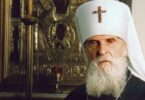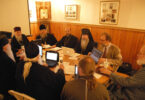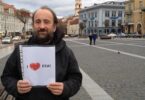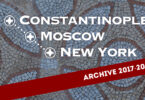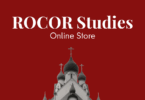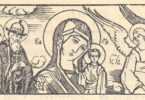From the Editor
In my view, there is no such thing as a “convenient” or “comfortable” history—only facts that call for reflection. In this light, the interview presented here with Bishop Barnabas (Prokofiev, 1945–2017) is of particular interest. Despite the problematic canonical status of both ROCOR’s parishes in Russia and the former Bishop Barnabas’s activities specifically, these communities expressed the desire of ROCOR’s bishops, clergy, and faithful to contribute to the spiritual renewal of their homeland. Bishop Barnabas, who held the title of Bishop of Cannes, was appointed in 1992 as the representative of the ROCOR Synod of Bishops in Russia. I recorded this interview with him in October of that same year in Jordanville.
Protodeacon Andrei
June 28, 2025
Holy Vladyka, can you comment on the goal and authority given to you by the Bishops’ Council in sending you to Russia at the beginning of this year?
At the beginning of this year, the main doctor of a medical clinic located in the walls of the Martha and Mary Convent in Moscow appealed to the Synod of ROCOR asking that he and his workers be taken under Her omophorion. This happened because the Moscow Patriarchate (MP) wanted to close the clinic and open a pay hotel in its place.
When I went to Moscow, I was appointed as the rector of the synodal metochion at the Martha and Mary Convent. Then, after a few months, I received a decree to organize a diocesan leadership. The Synod sent me to help our parishes, to be a link for them.
I arrived in Russia in January. At that time, I had a meeting with an employee from the office of the mayor of Moscow, Luzhkov (now mayor of Moscow). At that meeting, I turned over an official petition that ROCOR could start a metochion at the Martha and Mary Convent. There were no objections at the time.
One of the buildings (there are seven in the complex), earlier housing the clinic, was given to us by the Convent. We serve the services there four times a week.
Grabar’s workshops occupy the main church – there they restore icons, but it is unlikely they will go anywhere. The MP wants to open this church to the public.
When I figured that my visit to Luzhkov had been unsuccessful, I went to the Russian government. I tried to register not through the Moscow government, but the Russian government. We occupied the building since January, and they haven’t kicked us out yet. When some of our representatives from the Church Abroad went to the mayor with requests, they told them, “we won’t do anything for you until the Martha and Mary Convent issue is resolved.” Don’t believe them. The Martha and Mary convent upsets them, because they feel the importance of this place. I told the authorities, “Understand – we glorified the great princess, we have her holy relics; I consider the Martha and Mary Convent to be a gift from St. Elizabeth – to us, the unworthy.”
Do young people visit the Martha and Mary Convent?
Yes. And I try to talk to everyone. One of our priests was amazed that I went with him to the hospital. “What, a bishop is going to visit?” But this is normal for us, just human relations.
This year you visited Russia three times. Could you say something about your last visit?
Every day that I don’t serve, I’m at the Martha and Mary Convent from 9 to 5 receiving visitors. Not just clergy – anyone with questions can come to me with their questions, including journalists and their coworkers. It’s exhausting work, but I try to pay attention to everyone, so they would leave comforted. Also on my third visit, I went on several trips around Russia.
During my second visit to Russia this year, I received from Sergianism archimandrite Seraphim, the rector of the Archangel Michael Skete in the Pskov region (in Pravoslavnaia Rus’ no. 16 this skete was listed as being under the oversight of bishop Valentin, – ed.) There are 10 nuns in the skete, there is a large brick church built in the 19th century, all on two hectares of land. Visiting this skete happened at the start of my third visit to Russa. At the end of June, we took the beat-up Russian roads to see archimandrite Seraphim. The skete from the beginning was put under the Synod. In Minchurinsk, in the Tambov region, we received a cathedral with five priests. During my last visit we mostly worked to establish a Moscow diocese.
How is that going?
Now we are doing all the paperwork needed to register the diocese. The center should be in the capital. In particular, I would like that every priest of the Russian Church Abroad visiting Russia could have the opportunity to serve with our clergy and meet with the bishop. The diocese will be directly subject to the Synod of Bishops. Certain circles are very worried about the formation of this diocese, and they are doing everything possible to keep it from moving forward.
What is the spiritual state of the Russian people, in your opinion, after the fall of communism?
At the present time, the state is frightening. The people have literally become like animals. However, there are some spiritually mature people among them. It seems like there is no support, no strength, no hope. The democratizers have shown themselves. The MP is compromised to the limits, and there is still no repentance. Their leaders live like poisoned beasts. They have no subsidies from the government; the secular powers “kick down” churches to them, but there is no money for their restoration. The people don’t go to these empty churches. For church people, it is very difficult right now.
I will not lament the stagnant years, but at least then there was order, things were clear. Now what is happening in Russia is a wild caricature of 19th century America, where money and physical force resolved everything.
How does that manifest itself?
In everything. For example, Moscow is now a dangerous city. It wasn’t like this before. The powerful man survives and oppresses others. This leaves a mark on the spiritual state of the people. But the people endure. You can compare what is happening in Russia now to 19th century China – there are little “princes” and “generals” that control everything in their town. These people can turn off the water, the heat, and then you have to settle up with them.
I like the patriotic organization “Pamyat’” (Vladyka is thinking of the “Pamyat’” organization led by Dmitry D. Vasiliyev, and not one of the other organziations bearing this name) since it is trying to rehabilitate the people, teaching them about our faith Russian history and traditions, the ideals of monarchism. The organization itself is learning and developing. “Pamyat’” reminds me of a person that everyone spits on and curses – and such a person is my kind of person. When we think about “Pamyat’”, we think about the reputation that has been constructed for them. I don’t know why I should pay attention to what is in the newspapers. For now, their members understand: our motherland, our country, is in danger. We need to save it as a new time of troubles is starting.
The Church walks with the people. We are not taking part in any sort of struggle against political powers – we are on the side of Christ. The MP forbade doing funerals for soldiers in Moldova, where there is a war going on, so I sent a priest there to take care of anyone who asked – Orthodox Moldovans or Russians. I think that even a Jew can be considered a Russian, if he feels a connection with Russian culture. If people are proud of their Jewish heritage, then why is it a shameful thing now to be proud of Russia’s past?
In the Martha and Mary Convent we don’t have anything like, “Well, if you don’t belong to Pamyat’, you don’t have anything to do with us.” In the Martha and Mary Convent we take care of people with various views – after all, first of all we are a church.
A year ago, after the famous August events, we had a sort of euphoria, and then we saw how quickly things can change into a nightmare. Of course, this isn’t Old Russia; it’s something else. At the same time, we need to say that the Russian diaspora is also not what I remember from my youth, when there were more active Russian organizations and groups.
Can we consider the government that was recently called the USSR to be Russia?
Of course. The Lord has not abandoned Russia, and has glorified her through her martyrs. This is not Old Russia, but she could become even greater than she was.
Many people think that our bishops are focused completely on Russia now, and have forgotten their flock in the diaspora. What can you say about this?
No, I don’t think we are as busy with Russia as it seems.
How do you see relations between the hierarchy of the MP and the Old Believers?
The hierarchs see their parishes as a source of income, and are not concerned that they are losing their spiritual flock. Of course they’re concerned, but it’s because they’re losing income. These bishops are administrators, and their concerns are born from that.
What sorts of things are going on now among the clergy and laity of the patriarchate?
There is a sort of church pluralism that says, “do what you want, just don’t leave”. The same sort of thing as in our jurisdictions here: “pay your $10 a month, and we’re happy”.
In Russia, various sects are working against the Church. They crept in after the perestroika reforms. The MP in fact is going right along with these false teachings. The patriarchate has lost authority at this time where gaining authority is so easy. Why can’t it do anything? Wouldn’t it be easy to do a simple thing like getting rid of all plaques and statues of Lenin? Haven’t they already just decided how many dozen statues they’re going to leave in Moscow, and no one complained at all about this decision?
How can you remain silent on this, not cry out? Why is no one talking about this?
Even to such a government, which isn’t even trying to be Orthodox, the Church could say, “stop spreading pornography.” Any society controls its vices, but even in America you don’t see the sort of garbage you’re seeing in Russia now. If the Church won’t say anything, then who will?
What has the appearance of our Church’s parishes done for the Russian people?
Our parishes are just the thing that can bring about the true transfiguration of Russia. The appearance of our parishes is a miracle and mercy of God. Only the triumphant Church can entreat God about Russia.
Obviously, the Church will never have the same place in society as she had before, but she is being purified and strengthened. Then, maybe, the Church will start to feed all the Russian people. Even for non-believers, the Church is necessary for the people. The Church is necessary for all. Our relationship with those who come to the Church is determined by why they come – are they coming to the Church, or do they want to use the Church?
I really don’t like it when someone wants to use us as some sort of weapon against the MP, since not everyone who comes to use as to support opponents of the Patriarchate has pure motives. They may oppose it for various reasons. For example, they may simply be opponents of Russia or Orthodoxy.
On the whole, the people are darkened, unenlightened, and many of the concepts that we write about in our writings are not accessible to the people. We have few churches, many difficulties and problems. If we had more churches, the people would be with us. A Russian cannot exist without a church. A church is good for him and necessary for him. We are trying to teach our people how to live, and we have come to serve. There is a bleeding wound here, and we are bandaging it in order to heal it. The people are also teaching us patience and humility. We are working for the future. All of these years we have been waiting in the emigration to see these days.
What is the spiritual state of our Church in Russia?
It’s hard to say. There are very zealous pastors – good, bold – whom we could call confessors, ascetics. But there are some unfortunate aspects. The disorder in our Church in Russia is connected with the fact that people are in part not prepared for the service required of them. At the same time, in Suzdal, Vladyka Valentin is raising up his people in the spirit of the Church Abroad.
What difficulties are there in the process of establishing the Russian Church?
There are administrative difficulties in registering parishes and such. There is the battle that the MP is fighting against us through government agencies. All of Russia is sick, and you cannot demand on day one that people who have been in the MP so many years would immediately change their way of life and service. But you can’t turn them away.
How can you characterize the spiritual state of our Church Abroad?
Falling. However, for me, every visit to America makes me glad to see what is happening in the lives of the parishes.
How could someone who grew up in the Church Abroad concretely help Russia?
I think that a Russian person who grew up abroad could find a place there. He is needed here and in Russia. Wherever he is, a good person finds himself a place. In Russia there is such a need that no matter how many people you sent, it wouldn’t be enough.
You know, I think any attention, a kind word of compassion, that’s all a person needs. The aid sent here irritates me for many reasons. It’s not just peanuts, it’s mockery. The richest country in the world has come to this. Of course, when a child is hungry, you have to feed it, but that isn’t the most important thing. Everyone can do something. Start praying for Russia, try however you can to influence what is going on there. We need to start understanding that Russian people live there, not some kinds of Papuans, like the world sees Russia now, like some kind of Mongolia. It’s not at all like that.
Before the revolution in Russia, the cup was full. For seventy years they’ve been plundering it. It’s not plundered to the bottom, and they’re still plundering it today.
We are the Russian Church. We went through suffering and trials for the sins of Russian society. And now these trials are coming to an end. This does not mean that everyone in the diaspora will go back. However, at least according to Soviet statistics, there are several million Russians living abroad, and if each of them would think that he has a responsibility to his greatly-suffering nation, then he can help. We, our generation, cannot live just by remembering our parents, we need to have a living connection with Russia. If I had not started going to Russia when I was young, I probably would not have become a priest.
If, say, you think that six days your soul lives in America, and then the seventh day, when you go to church, in Russia, that’s not life – that’s schizophrenia.
Clergy are going to Russia. A priest from the diaspora can definitely leave his flock for vacation and spend it in Russia. We need more of our priests from Russia to visit us here and vice-versa. So we would build a connection.
We must not divide Russian people into Soviets and Russians abroad. Why do we love Americans, French, but not a Russian who came here from Russia. We are closer to Russians from Russia then to French people. Even though there are Soviet people there, there are also Russian, despite all the Soviet terror.
The diaspora cannot become self-satisfied. We see that we are dissolving. And we will not stand if we don’t receive a booster shot. Who are we? We are the healthy cells that can inoculate the ailing Russian body. If we have lost our feeling of care for Russia, then we have left our roots, and have given in to secularization.
We see now, that for the past several years, faithful Christians from different parts of the world, from different ethnic backgrounds, are gathering around the Russian Church Abroad. Can we say that the Church is entering a new phase of existence?
Yes, we are gathering strength. The fact that people are turning to us has colossal meaning for our resistance and struggle against false teaching, from which the Church is suffering. Our enemy is gaining strength, but we are also gaining allies.
What does this time mean for children of the Church Abroad? What tasks await us all?
We will not only answer for what we did for our salvation, but for whether we served Russia or only ourselves.


